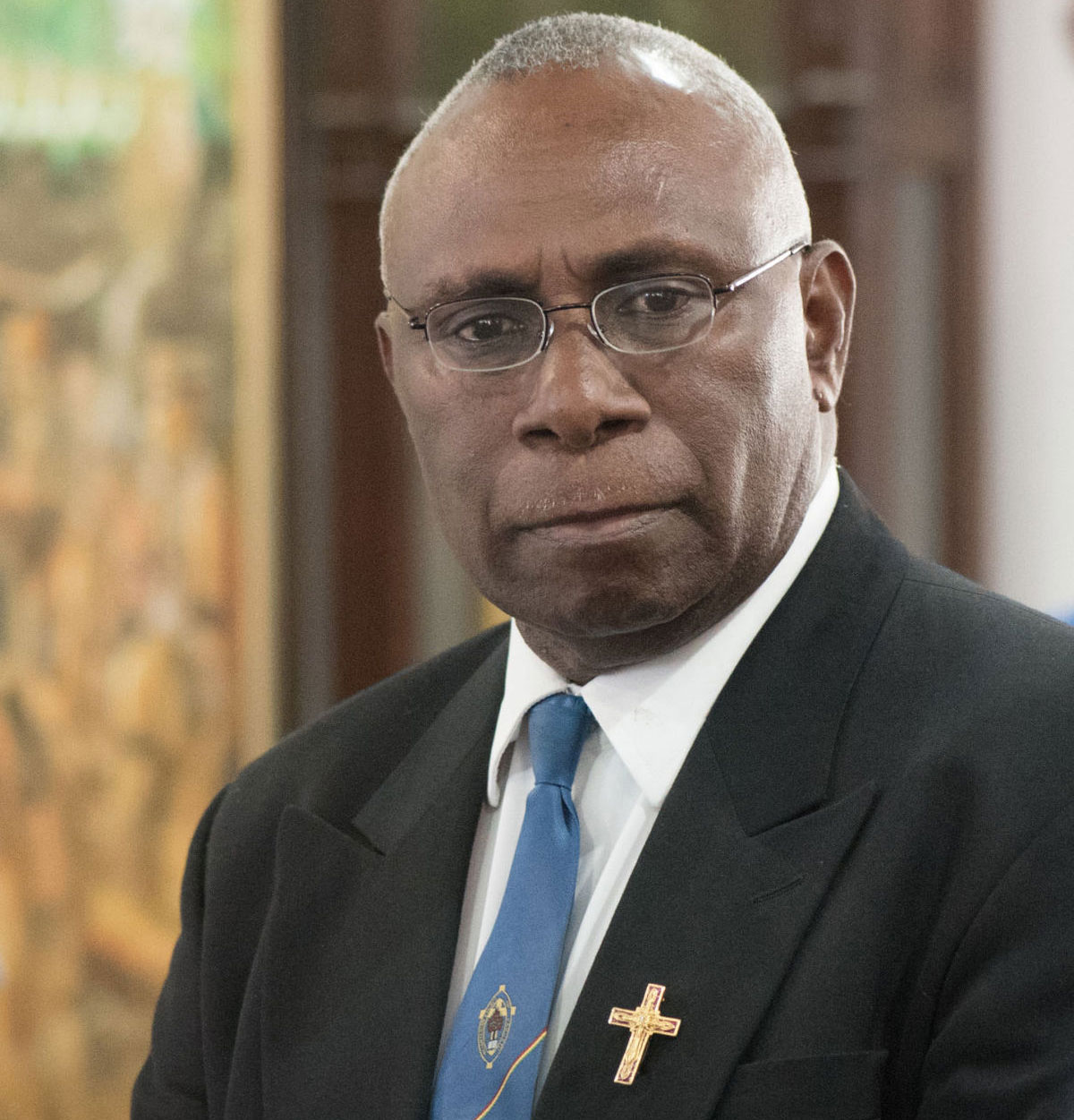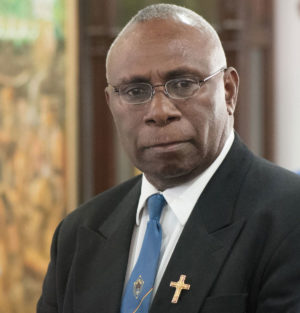



Moses was originally from West Ambrym. He studied at the Sydney Missionary and Bible College in Australia from 1980 to 1981 and graduated with Diploma in Divinity and Mission. He later studied at Takla between 1985 and 1986, graduating with a Diploma in Theology. He went back to Australia in 1989 and studied at Alan Walker School of Evangelism, where he graduated in 1989 with Certificate of Merit.
Moses also served as a pastor at Erromango, Ranon in North Ambrym, Luganville and Bamefau. A long-serving pastor and a former moderator of the Presbyterian Church of Vanuatu (elected in 2009) after received religious training and education in Australia and Papua New Guinea[3] when he was chosen among 16 candidates after four rounds of voting (received 40 votes out of 57 from the Electoral College) to succeed Baldwin Lonsdale, who had died in office.
Source: https://en.wikipedia.org/wiki/Tallis_Obed_Moses
He worked first as Secretary to the South West Bay Cooperative Society, from 1978 to 1982, then went into private business (in “retail and fishing”) until 1998.
He served in office in the Malampa Province assembly from 1992 to 1996, then was elected Member of the national Parliament for Malekula in the December 1998 general election. He is currently a member of the Melanesian Progressive Party.
Initially a backbencher, he was appointed Minister for Cooperatives and Ni-Vanuatu Business Development (i.e., indigenous business development) in Prime Minister Sato Kilman’s Cabinet on February 18, 2010. Kilman was attempting to consolidate his government’s majority prior to an expected vote on a motion of confidence in Parliament. He lost office on April 24 when the Kilman government was ousted in a motion of no confidence, regained it on May 13 when the Court of Appeal declared the election of the new government unconstitutional,[8] and lost it again on May 17 when Kilman reshuffled his government and replaced him with Don Ken.
Kilman’s government fell on 21 March 2013 when it lost the confidence of Parliament, and new Prime Minister Moana Carcasses Kalosil appointed Sae to the position of Minister for Infrastructure and Public Utilities two days later. He crossed the floor on 15 May 2014 to help bring down the Carcasses government. New Prime Minister Joe Natuman maintained Saimon at his post as Minister for Infrastructure. He lost office on 11 June 2015 when the Natuman government was ousted in a motion of no confidence.
On 11 February 2016 he was elected as Speaker of the Parliament of Vanuatu.
Iolu Johnson Abil (born 1942) is a Vanuatuan politician. He was elected and sworn in as the President of Vanuatu on 2 September 2009.
Abil is from Tanna island, which is located in Vanuatu’s southernmost Tafea Province. He was born in the village of Lauaneai on Tanna in the New Hebrides in 1942 to parents George Yavinian and Nassaiu. His father originally owned his own store, but closed the business after Iolu later suggested the family join a business cooperative.
Abil holds the chiefly title of Yaniniko, which means chief’s spokesman on the island of Tanna. His hereditary title was granted to him by his grandfather, Joe Yautim, who was a Yaramara, or chief, on Tanna. Abil’s father, George Yavinian, was also a chief, but had not been granted the right to be a chiefly spokesperson as of the early 1980s.
Abil attended the local Lenakel village elementary school on his home island of Tanna. He next enrolled at Lenakel Senior Primary School, which he attended from 1956 until 1958. He graduated from Onesua High School.
He is an elder in the Presbyterian Church in Vanuatu.
Abil joined the British National Service as a cooperative inspector in 1964. He also took a job with the New Hebrides Cooperative Department in 1964, a position he held for the next sixteen years. He enrolled in cooperative development training courses in Papua New Guinea and Fiji during the 1960s. He then became a student at the Loughborough International Co-operative College in the United Kingdom for two years.
Abil completed three months of administration and management courses at the University of the South Pacific in Suva, Fiji, in 1973.
He served in the Cabinet member in the first post-independence government of Prime Minister Walter Lini, thereby becoming Vanuatu’s first Secretary of the Ministry of Lands.
Iolu Abil was appointed as the interim Ombudsman of Vanuatu in November 2004, following the departure of Hannington Alatoa, whose term in office had expired in June 2004. Abil served as interim Ombudsman until April 2005 when Peter Taurakoto was appointed to a five-year term by then President Kalkot Mataskelekele.
Abil has also held a number of positions within the private sector, including as chairman of Air Vanuatu.
Abil was elected President by Vanuatu’s 58-member electoral college on 2 September 2009. Abil was elected on the electoral college’s third round of voting in two days. No candidate had garnered the required two-thirds of the vote in electoral college in previous two rounds of voting.
Several members of parliament within Prime Minister Edward Natapei’s governing coalition had supported former President Kalkot Mataskelekele in the first two rounds of the election. Mataskelekele’s five-year term as President had ended on 16 August 2009, and he had been renominated for a second term. However, all members of Natapei coalition had unanimously agreed to support Abil in the third round on 2 September 2009.
Abil defeated six other candidates who had been nominated for president in the electoral college’s third round. With the support of Prime Minister Natapei, he secured 41 votes within the 52-member electoral college, which won the presidency of Vanuatu. He was sworn in as President of Vanuatu on the evening of 2 September 2009.
Kalkot Mataskelekele had been the President of Vanuatu since 2004. His term lasted five years.
He is a lawyer from the national capital, Port Vila, and is the first Head of State of Vanuatu to have a university degree. He was elected by the electoral college, which consists of the Parliament and regional Presidents, on August 16, 2004, and sworn in the same day.He had previously been a candidate in the presidential election of April 2004, and was backed by the government of Edward Natapei. However, after several inconclusive rounds in the electoral college, he was defeated by Alfred Maseng. After the impeachment of Maseng and a parliamentary election, a new election was held on August 12 2004, which was inconclusive and was continued on August 16. Though Kalkot was widely expected to win, there were many other candidates, and he faced tough opposition from Willie David Saul and former Prime Minister Donald Kalpokas. In the final round of voting, Kalkot defeated Saul by a vote of 49 to 7.
Rishi Sunak, Prime Minister of the United Kingdom (since Oct 25, 2022) Rishi Sunak (born…
Giorgia Meloni, Prime Minister of Italy (since Oct 22, 2022) Giorgia Meloni (born 15 January…
Mahamat Déby, President of Chad (since Oct 10, 2022) Mahamat Idriss Déby Itno (born 1…
João Lourenço, President of Angola (sworn in on Sept 26, 2017) Sworn in for his…
William Ruto, President of Kenya (elected on Aug 9, 2022 with 50.5% of the vote)…
Gustavo Petro, President of Colombia (since Aug 7, 2022) Gustavo Francisco Petro Urrego ODB ODSC…
This website uses cookies.